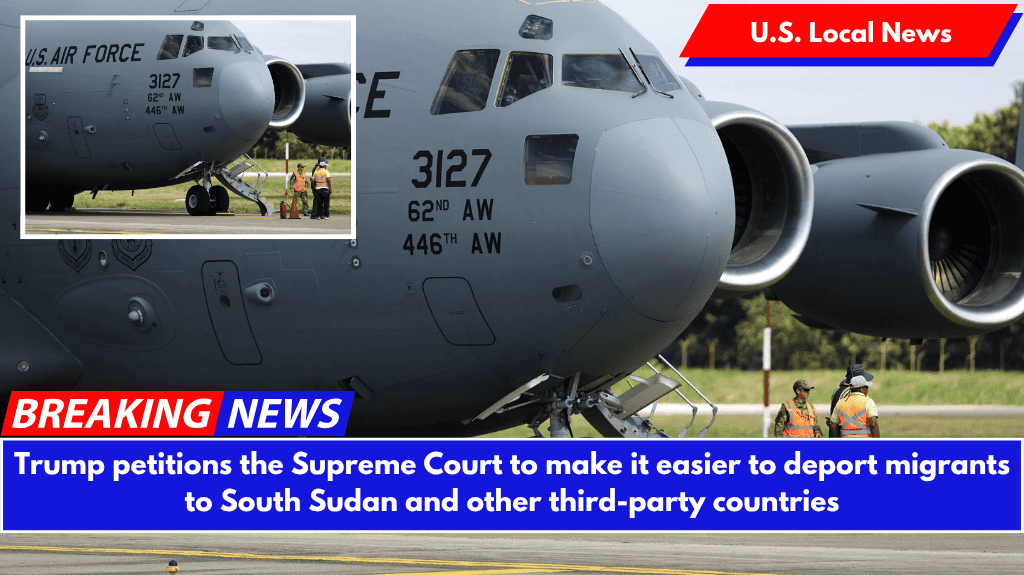On Tuesday, President Donald Trump requested that the Supreme Court make it easier for his administration to deport people to South Sudan and other non-homeland countries. This is the latest in a series of controversial immigration policies brought before the conservative-majority court.
The issue is a policy that the administration implemented shortly after taking office, allowing the Department of Homeland Security to deport immigrants to countries other than their home country or one where they have legal status – without first notifying them or giving them the opportunity to claim persecution, torture, or death in that third-party country.
The appeal was filed in the Supreme Court just days after the administration attempted to transfer detainees to war-torn South Sudan without providing them with a meaningful opportunity to contest their removal to a location where they could face torture.
“The United States is facing an illegal immigration crisis, in no small part because many aliens most deserving of removal are frequently the most difficult to remove,” the Department of Justice told the Supreme Court.
After a group of migrants facing deportation sued, US District Judge Brian Murphy, a Biden appointee, ruled in March that the administration cannot deport migrants to countries other than their own without providing written notice and giving the targeted immigrant the opportunity to demonstrate a credible fear of persecution or torture in that other country.
Murphy later stated that the Trump administration “unquestionably” violated his court order by attempting to transfer detainees to South Sudan.
“It was impossible for these people to have a meaningful opportunity to object to their transfer to South Sudan,” Murphy said, citing the rushed timeline and the fact that much of what happened occurred after business hours, when the detainees couldn’t reach their lawyers or families.
Murphy clarified a previously issued preliminary injunction by imposing additional requirements.
Murphy stated in a two-page order issued on May 21 that officials must provide the migrants the administration attempted to transfer to South Sudan “no fewer than 72 hours’ notice of the scheduled time” of an interview in which they could claim they were afraid of being sent to a third country.
Migrants who are not found to have a “reasonable fear” will be given 15 days to reopen their immigration cases and challenge their removal to a third country, according to the judge’s order.
The Trump administration stated that Murphy’s handling of those migrants demonstrated why it requires emergency relief from the Supreme Court.
“Last week, the district court required the government to halt the ongoing third-country removal of the aforementioned criminal aliens to South Sudan,” the administration informed the Supreme Court.
“As a result, the United States has been put to the intolerable choice of holding these aliens for additional proceedings at a military facility on foreign soil—where each day of their continued confinement risks grave harm to American foreign policy—or bringing these convicted criminals back to America.”
The Trump administration has claimed that those requirements are not outlined in the law, and officials have stated that they already have procedures in place to ensure that migrants are not persecuted in a third country.
The first step in these procedures is to seek diplomatic assurances from the country that people removed from the United States will not be tortured.
Earlier this month, the Boston-based 1st US Circuit Court of Appeals denied the government’s request to halt Murphy’s ruling, a decision that came amid growing concern about reported plans to send migrants to Libya, a country widely condemned for mistreatment of detainees and ongoing civil unrest.
The appeals court expressed several “concerns” about allowing the Trump administration to reinstate the policy, including “the irreparable harm that will result from wrongful removals in this context.”
In May, Murphy stated that reported plans to deport people to Libya or Saudi Arabia would clearly violate his order. Immigrant rights organizations filed an emergency motion after a Trump administration official told CNN that a group of undocumented migrants would be flown to Libya on a US military plane.
The Libyan Ministry of Foreign Affairs informed CNN that it “categorically denied any agreement or coordination with US authorities regarding the deportation of migrants to Libya.”











